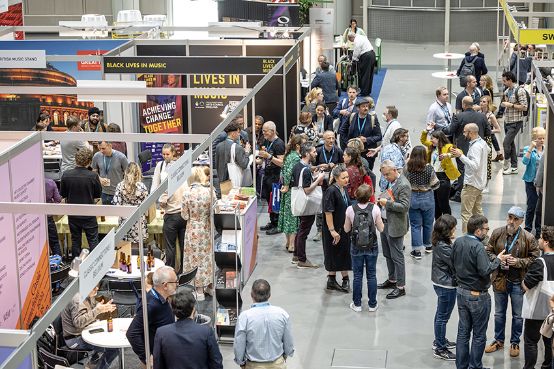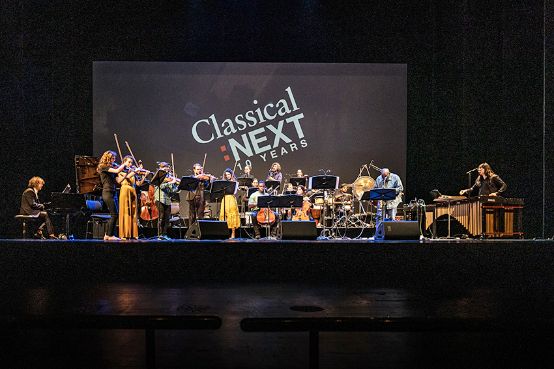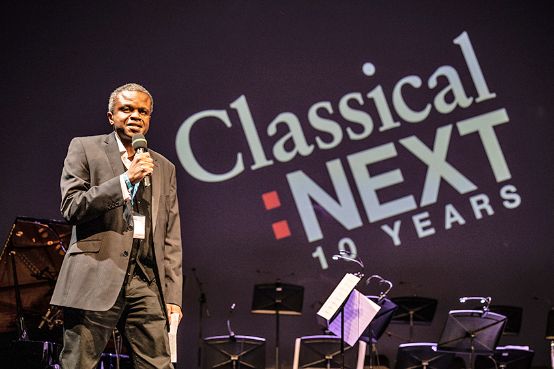Classical music seeks diversity
The international symposium Classical:next was dedicated to questions of collaboration and openness. Fair access in the classical music sector is lacking.

The opening of the ten-year-old classical music fair was celebrated in a festive and exuberant atmosphere at the Hanover State Opera. Hanover, which has been awarded the title of Unesco City of Music, is the new location of the specialist meeting for event organizers, music associations, the music industry and music creatives after Rotterdam. Hundreds of delegates were clearly determined to actively tackle the consequences of the past two years and the challenges posed by the climate catastrophe and the threat of war in Eastern Europe. The show created especially for the opening NEXT:matters! inspired with the world premiere of Dubwise and Dread Volume 1 by Jason Yarde and works by Maximilian Guth, performed to ravishing effect by Asambura (Hanover) and Colorfull UK.
-

Asambura and Colorfull UK on the opening night. Photo: Classical:next/Eric van Nieuwland
When is a practice fair?
Even more so than at previous editions of the international specialist meeting, the Congress Center on the outskirts of the city was the venue for four days of discussion and debate on whether access to the diverse worlds of the sector is finally fair. Have the questions surrounding exclusivity - often invoked in the past - and diversity not been asked often enough? How can the gatekeepers described as problematic be stopped and diversity realized?
The tendering process for composition commissions, for example, already contains a number of stumbling blocks on the way to fair commissioning practices. In the UK, for example, it has been recorded that female composers receive around 1500 euros less in fees than their male colleagues, due to the fact that they are always commissioned for small ensembles and do not get the big ensembles. It was reported from Norway that only around ten percent of the income generated by commissions goes to women. In the Netherlands, it is even common practice to leave the securing of funding to the composers. Anne La Berge (Dutch professional association of composers Nieuw Geneco, NL) presented "Fair Practice". Among other things, it is proposed to award commissions as cooperative communities and to use partner models to achieve more than just one premiere. She emphasized that female composers should definitely sell themselves better and, if necessary, also organize themselves.
Is there progress or regression?
Who are we leaving behind? The music industry and its echo chambers have still not managed to create fair access conditions to education, scholarships and the labor market. Even in the case of an "open call", it cannot be assumed that equal conditions already guarantee fair access. As this also applies to the area of talent development, all players in music education are invited to examine their own behavior and institutional practices for bias.
-

Roger Wilson appeals for honesty. Photo: Classical:next/Eric van Nieuwland
Roger Wilson (Black Lives in Music, UK) called on the enthusiastically discussing audience to be more honest: Has anything changed since the death of George Floyd in 2020? Is (racist) inequality being confronted more strongly? Is the classical music industry "enslaved" in its traditions? Wilson identified four areas in which change needs to happen: Governance, programming, recruitment and communication. As soon as a more diverse (program) offering succeeds in reaching a younger audience, the chances of continuing to operate successfully in the future will increase. Drawing up a time and action plan, underpinning it with goals and, above all, collecting data should be possible in every institution that sets out to give people outside its own bubble the opportunity to participate. Time is of the essence, the conditions have become worse (see report Being Black In The UK Music Industry).
What happens next?
In the past two years, the classical music sector has changed more in the digital realm than in the 15 years before. Benjamin Woodroffe (Global Foundation for the Performing Arts, New York/Geneva) discussed a survey of British musicians from 2020/21 with musicologist Julia Haferkorn (Middlesex University, UK). The opportunities of digital distribution at lower costs, the acquisition of new audiences who are willing to make an emotional and monetary commitment, were described as promising; nevertheless, the concern of earning much less in the digital concert space than with live performances remains.
These questions were also discussed in depth at the Swiss Music stand, organized by Fondation Suisa and Pro Helvetia. These days, when many houses and ensembles are publishing their 22/23 season brochures, offer a good opportunity to study programs and casts for diversity.
More than 900 professionals from the wider classical music sector from 50 countries took part in the successful four-day event for the further development of the music scene and industry. Innovation awards went to the music promoter Death of Classical (USA) and the Orquesta Filarmónica de Medellín (Colombia), among others.
Incidentally, the event will take a break in 2023 to further develop the concept together with ideas from the community.








